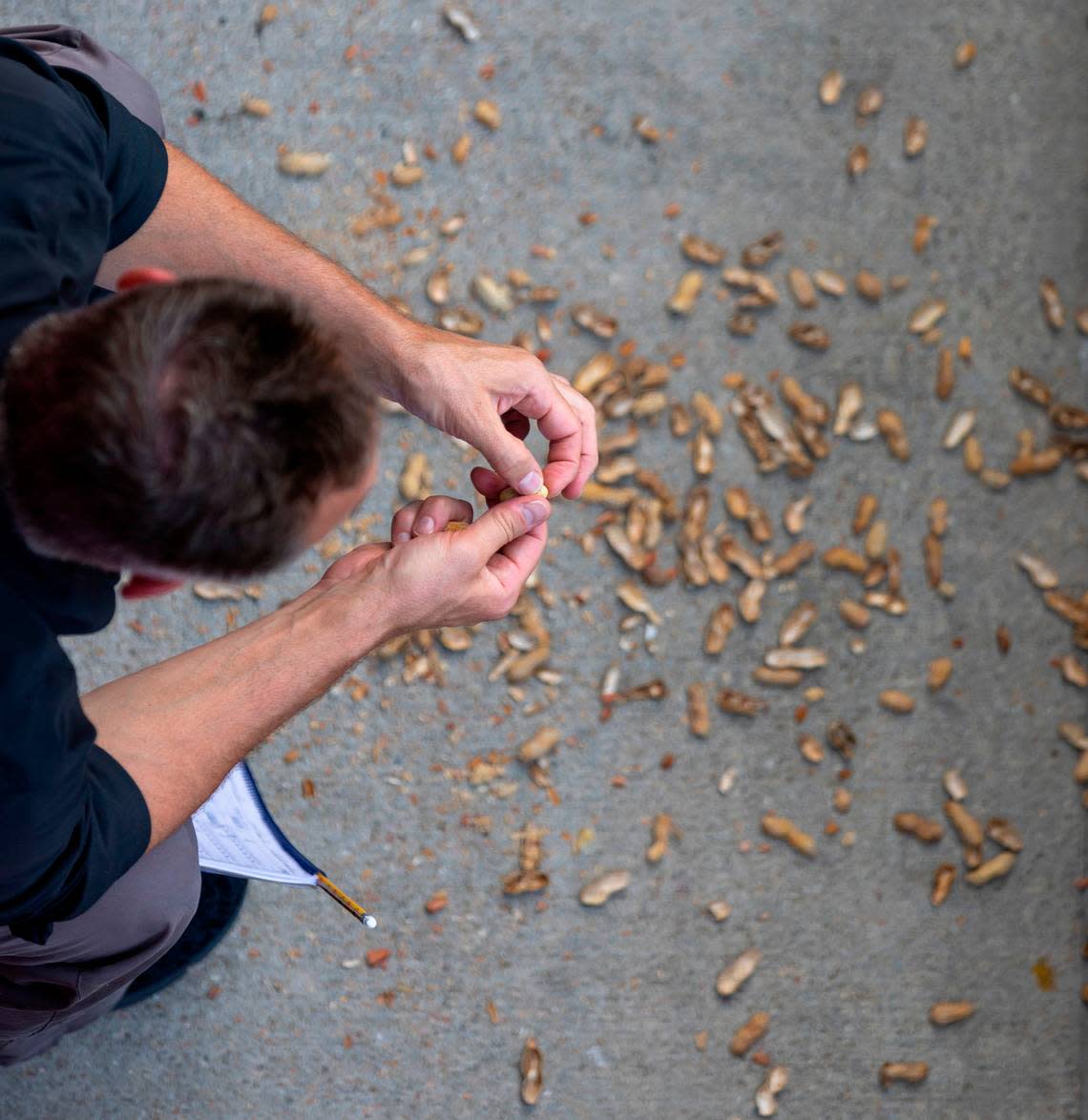Big League peanuts: North Carolina’s essential role in feeding the American pastime
The man climbed into the tractor — a big green John Deere 8235R, to be exact — and took his seat behind the oversized windshield, nothing but straight lines in the dirt in front of him, about as far as the eye could see. There was no breeze, but dust still hung in the air; the sun shone bright and hot. It was the second week of May, prime peanut-planting time, and of all the things that had changed in this part of rural northeastern North Carolina, some rituals remained the same.
The man’s name was Ray Mann, though the folks he worked alongside on Donny Lassiter’s farm had taken to calling him RayMan. Years ago he had his own small farm, then retired and then found himself “bored to death.” That led him to Lassiter, whose grandfather first worked this land as a sharecropper, and who’s now one of the most productive peanut farmers in Northampton County — or any other county in this state.
Lassiter’s farm, and others like it throughout North Carolina, is the starting point for millions of peanuts destined for the Big Leagues.
Chances are anyone who’s been to a Major League Baseball stadium recently, and who’s partaken in a bag of peanuts, has consumed a product of northeastern North Carolina soil. At the least, those peanuts very likely came through the peanut factory at Hampton Farms, which from its Northampton County headquarters sends hundreds of millions of pounds of peanuts all over the country.

On a Friday in mid-May, Mann shifted the tractor into gear and pulled off slowly, looking down every now and then at two screens that guided his way. Everything’s automated these days, or a lot of it, the planter pushing the seeds into the earth at precisely the right intervals, the lines razor straight, the hum of the engine providing a steady soundtrack to the work. It was all much more primitive when he began working in peanut fields when he was 12 years old.
“So what’s that?” Mann asked, doing the math in his head, adding up how long he’d been planting peanuts. “Fifty-five years.”
He could still see boyhood scenes of crowded sidewalks in Murfreesboro, the nearest town, where on Saturday mornings “you couldn’t hardly walk down the street,” and where now it’s much quieter. Mann was born in his childhood home, “me and my five sisters,” he said. “Ain’t many people can say that anymore,” though he hoped that maybe small-town America was on its way back. He couldn’t say for sure, but that’s what he thought.
What he knew was the soil was just right, and the climate, too. What he knew was that some of these peanuts that were going into the ground today would produce 15 or 20 or more peanuts of their own, and that some of those would grow up and go off to Major League Baseball stadiums all over the country; that a great many of these peanuts that’d grow in this field were destined for The Show, little legume versions of Nuke LaLoosh; hot prospects, if not a little salty.
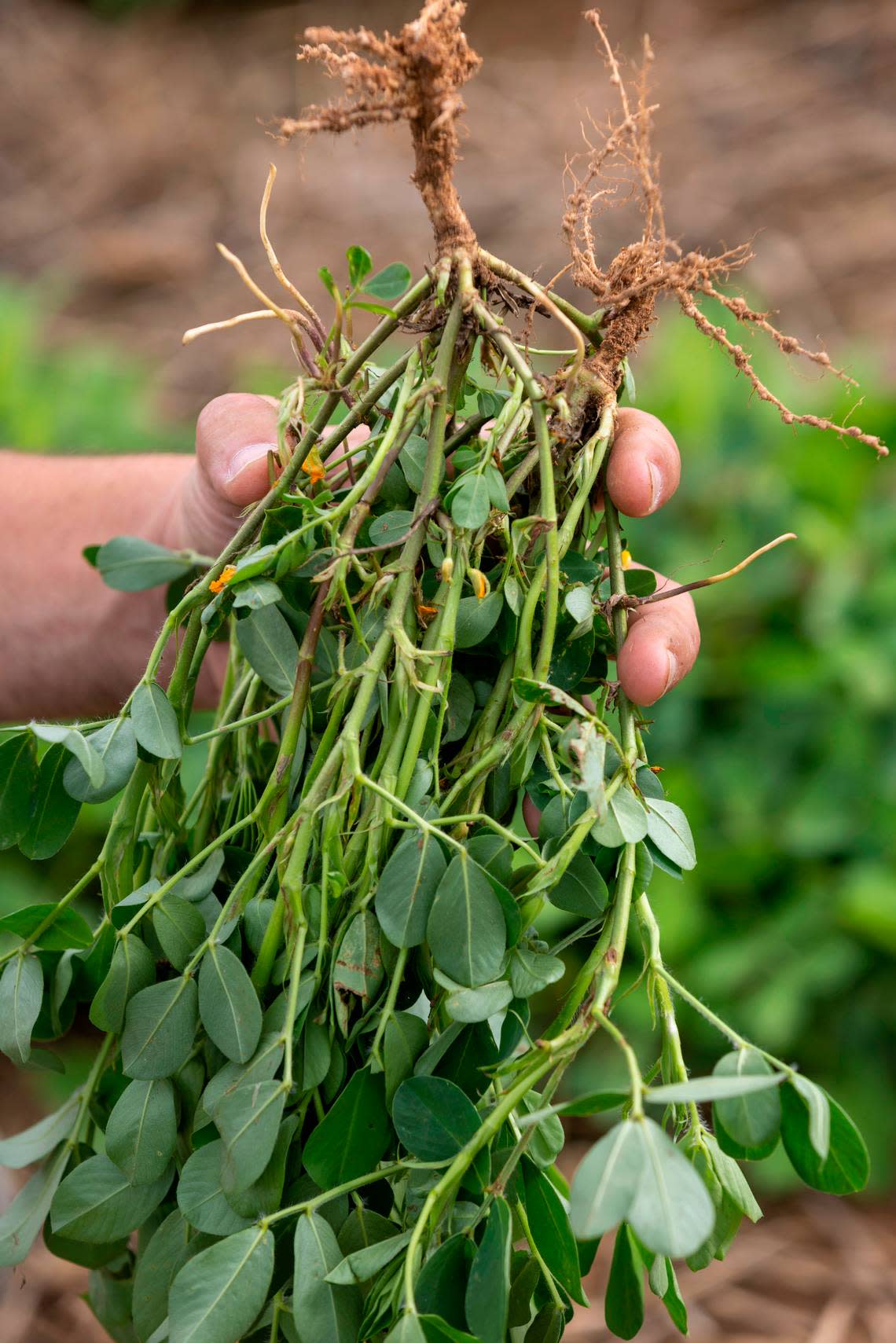
Lassiter, 44, made the rounds in his truck. He had RayMan working the planter in what they called “the big field,” and another tractor planting “in the hole.” The little farm that began after his grandfather returned from World World II, that grew after his father came home from Vietnam, had turned into a sprawling 10,000 acres, some Lassiter rented, some he owned. About 1,500 of those acres he devoted to peanuts — the Virginia peanut, in particular, in-shell; the kind that long ago became the most popular and only choice for ballpark snacking.
It was those days he could climb into the tractor, himself, that Lassiter most savored. Those days he could turn off the two-way radio and do the work of his father or grandfather, the work of placing a seed into the dirt and nurturing it to grow. They were rarer now for him, what with the growth of the farm and all that came with it. He’d become part of a peanut-producing machine, an empire responsible for the majority of in-shell peanuts in the United States, and ballparks everywhere.
That night, a Friday near mid-May, brought a full slate of Major League games. It brought to mind images of vendors hawking peanuts in the aisles, of people rising in song during seventh-inning stretches from Los Angeles to Washington, D.C.
... Buy me some peanuts
and Cracker Jack ...
Meanwhile, in a little corner of northeastern North Carolina, the next batch was in the ground in a 30-acre plot of Lassiter Family Farms. In about five months or so, with help from the weather gods and God Himself, they’d be ready.
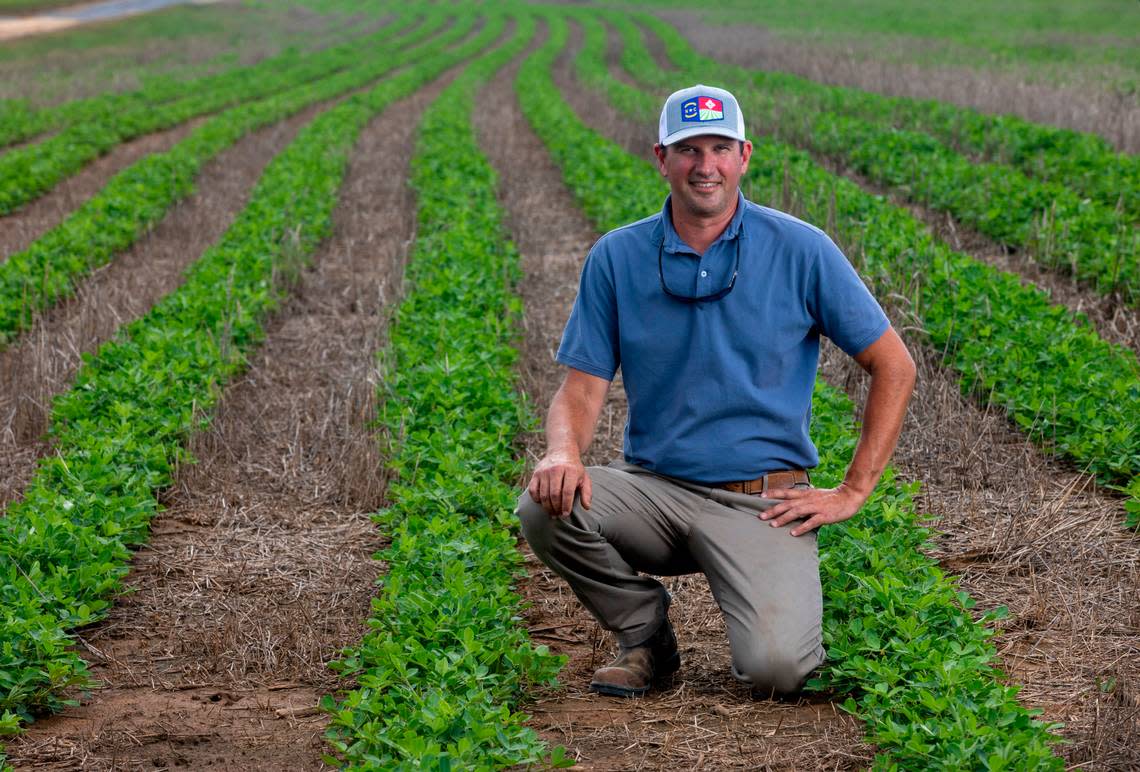
Resilient crop, resilient people
About a year ago Donny Lassiter traveled with his wife and two children to Sedona, Arizona. They went into a store and found themselves in the peanut aisle. He pulled a bag of in-shell nuts from the shelf, turned it over and read where they came from: Hampton Farms in Severn, a dot on a map not far from Lassiter’s farm. For all he knew those peanuts could have come from his land.
Lassiter is tall, well-built, tan from the fields, an outdoorsy ruggedness about him. He earned his undergraduate and master’s degrees from N.C. State and his dialect from these northeastern North Carolina flatlands, where the tallest structures for miles are either grain silos or the deer stands that rise out of crops like mini fire towers. He can trace parts of his farm to 1944, when his grandfather came home and married into 20 acres, and married out of sharecropping. Lassiter can’t trace how long his people have grown peanuts.
“Probably since George Washington Carver figured out that it was a great crop for the Southeast,” he said.
The bond between the crop and the region is part of American mythology, dating to before Jimmy Carter’s rise from a Georgia peanut farm to the presidency. The land southwest of Norfolk, Virginia, and through North Carolina, following the coast, is especially inviting for the Virginia peanut, the kind destined for the Big Leagues.
A Virginia peanut looks like Planters’ Mr. Peanut, except for the top hat and monocle and other accouterments. A Virginia peanut has needs. It needs the sandy loam soil endemic to northeastern North Carolina. It needs the July and August rains that roll through on their way to the sea.
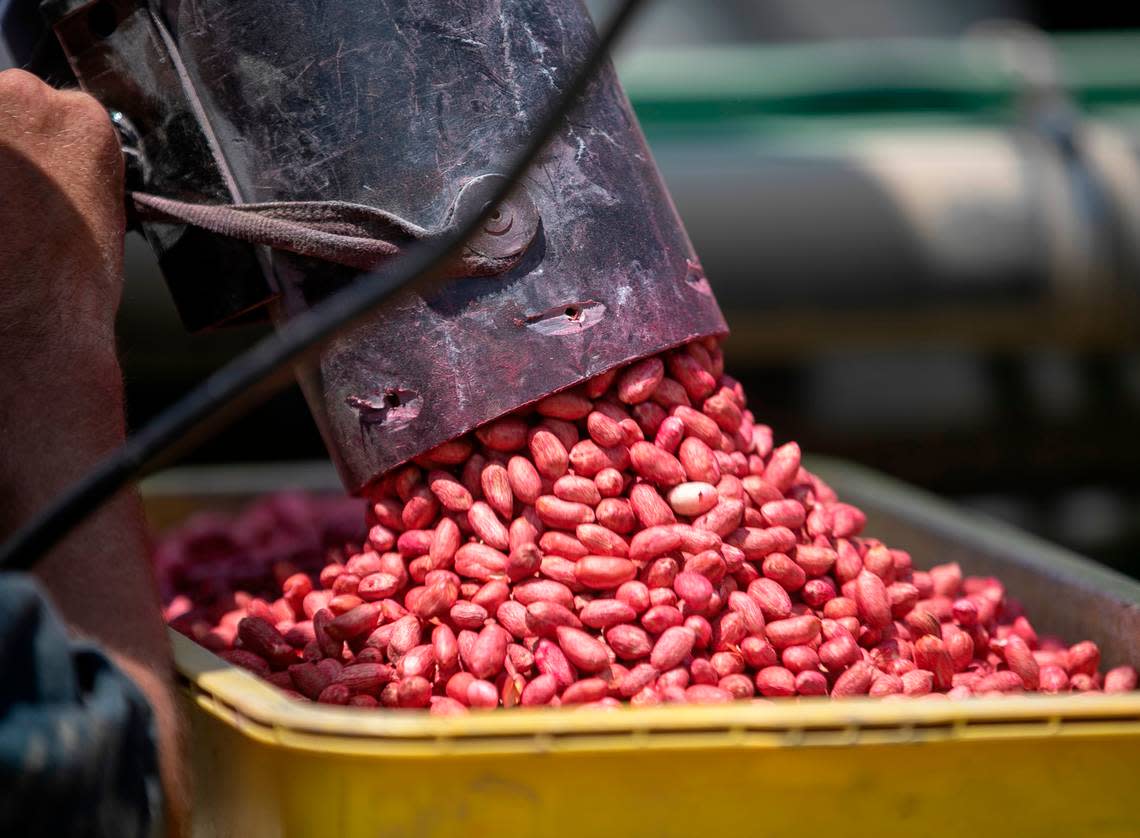
If all goes well, Virginia peanuts grow large enough to be cracked open with ease. Their color turns an alluring golden brown.
“That bright hull is what everybody wants when they go to the ballpark,” Lassiter said, and he speaks from experience. He brings to mind those old Hair Club For Men commercials from the 1980s — the pitchman saying he’s not only the president, “I’m also a client” — in that Lassiter not only grows peanuts, but he consumes an endless quantity of them, in all forms, and never tires from the taste. There’s an honor in his consumption, and in the act of lining up at a stadium concession stand and walking away with something he may well have helped create.
“And as farmers, we take a great deal of pride in what we do,” he said. “And to see it all the way through and go to a ballgame, be with your family, enjoy a ballgame and eat a bag of peanuts that you might’ve had a part in producing?
“That’s pretty surreal, man.”
It’s likely enough that Lassiter’s peanuts wind up in any given bag produced by Hampton Farms, which is the ultimate destination for a great many North Carolina peanut farmers. Lassiter is among Hampton Farms’ most productive growers; last year, in fact, he set an individual record with a harvest of 5,000 pounds of peanuts per acre. Given Lassiter devotes about 1,500 acres to peanuts, that translated into 7.5 million pounds of them, give or take.
It can be difficult to visualize that many peanuts — approaching 4,000 tons — without a visit to the headquarters of Hampton Farms, formerly known as the Northampton Farms, also known as the Severn Peanut Company, as it was originally called when it came to be a very long time ago. It’s still in Severn, just off the railroad tracks, near the stores that have shut down and the houses that still stand, monuments to a different time. The factory is only about a 20-minute drive from Lassiter’s farm.
The ride there follows lonely two-lane roads and crops and old barns and farmhouses falling back into the land, vines and roots reclaiming them. A 1950s-looking Chevy truck rotting and rusting off the side of the road. Closed and crumbling service stations with old Pepsi logos out front. Railroad crossings without barricades that wait for a train.
There are little towns barely hanging on nearby and others faring worse than that in one of North Carolina’s most impoverished counties. And then, one of the few things around here that hasn’t faded away but has actually grown. A peanut factory, off of Peanut Road. A hard shell of resilience in a hard-luck place.
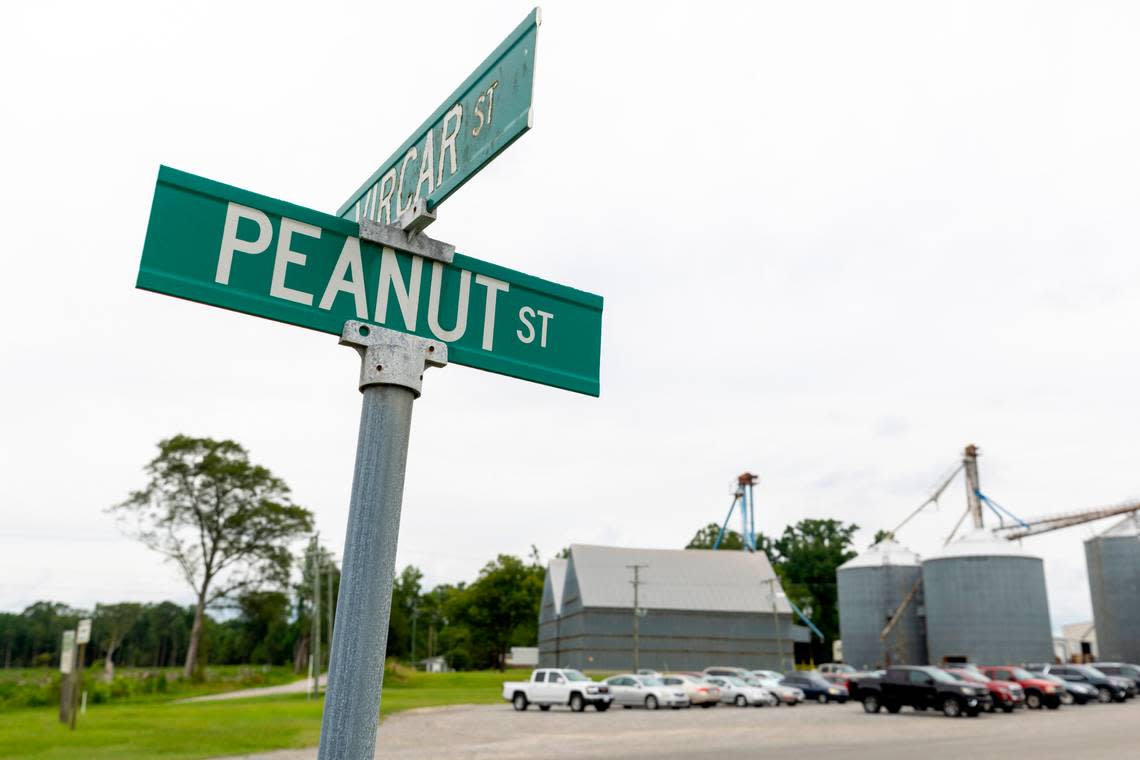
Baseball and peanuts
A row of tractor-trailers sat backed up to the warehouse in Severn on a Monday morning in July, waiting for their cargo. Waiting to deliver peanuts all over America. On any given day, more than two dozen semis will come through here, and those are just the tractor-trailers. There’s also the delivery trucks that go “to all kinds of places,” said R.P. Watson, who has worked at this factory just about as long as he can remember.
“We ship two or three UPS trucks a day out just to small ballparks here and yonder and everywhere,” he said, because it’s not just the Major League parks that require peanuts but the ones all over the United States that host Legion ball and Little League, where parents or girlfriends might bond or break the monotony over a bag of the quintessential baseball snack, leaving behind little piles of shells as proof of an afternoon or evening well spent.
What is it, anyway, about baseball and peanuts? The relationship dates to the late 1800s, according to the National Peanut Board, which cites a book, “The Joy of Ballpark Food,” that details the origin story. It began in 1895, when a “ballpark concessioner, Harry Stevens, sold advertising space on scorecards to a peanut company.” The company did not pay in American currency, but in product.
In peanuts, to be sold at games. And so a tradition was born.
The song “Take Me Out to the Ballgame” came along in 1908, and peanuts and Cracker Jack entered the canon of American pop culture. Together they became one of those iconic American duos, the Batman and Robin of ballpark snacks, before Batman and Robin even existed. Sure, there are other ballpark staples. The hot dog. An iced cold beer, preferably purchased from a vendor who has perfected the ballpark cry of “ICED cold!” or “BEEAAH HEEAAH!” while toting a tray of full plastic cups sloshing about on top of his head. With respect to those, though, peanuts are different.
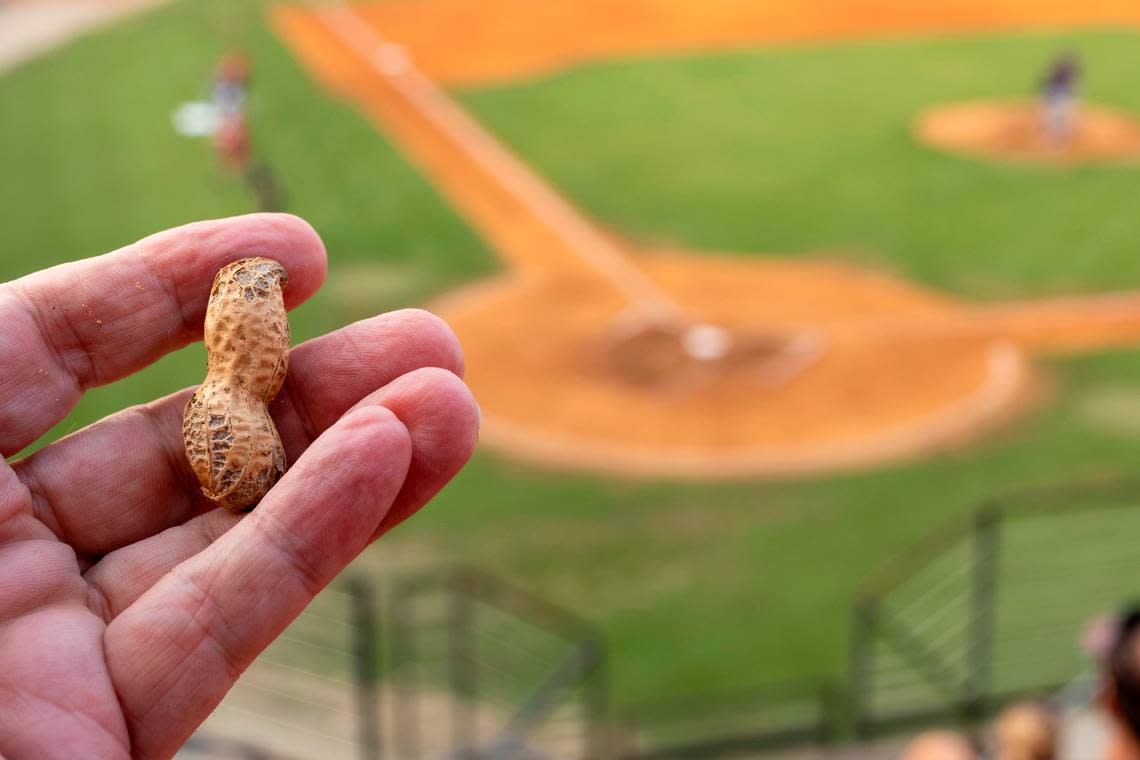
Beer, for instance, lacks the overall nutritional value. And nobody can really be sure what’s in a hot dog, or how it came to be. Even Cracker Jack, with its relatively modest ingredient list, still contains something called soy lecithin, plus all the sugar. The peanut, meanwhile, is pure. Nearly unaltered from its natural state. It spends months underground, maturing, preparing, and when it’s ready it practically goes into the bag as is. The ingredient list on a bag of regular ballpark peanuts reveals the simplicity. The peanuts consist of peanuts. And salt. And that’s it.
Peanuts, too, offer small surprises that beer and hot dogs and Cracker Jack cannot match. Each shell is a present waiting to be opened. Sometimes there might be three peanuts in one. Others there might be one, or none. The peanut has a playfulness. Sometimes it tricks. Most often it treats.
Not every peanut, though, is destined for the Majors. The farmers’ harvests are sorted at Hampton Farms, where workers manually determine which nuts make the cut. Only the largest, with the most ideal color, pass through. Others become cocktail peanuts or peanuts in candy bars or become peanut butter, either in a jar or in the middle of a pretzel. Hampton Farms makes all manner of peanut-related products, just about everything imaginable, but it’s the relationship with Major League Baseball that perhaps elicits the most pride.
That, and just the overall story of the place.
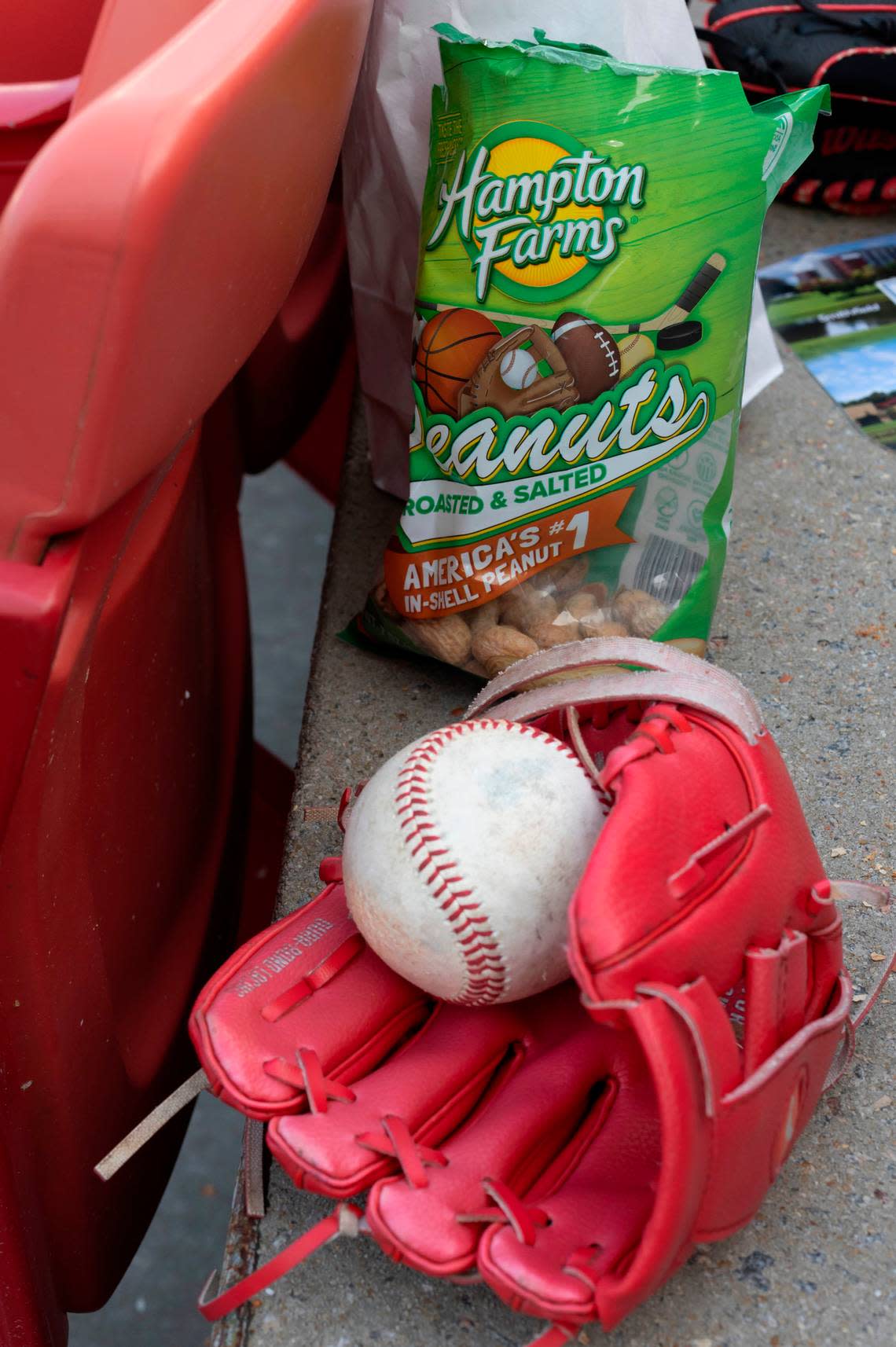
The ‘Walmart transition’
Three local farming families founded the company in 1946, back when there was more to Severn than there is now. Watson, now the vice president of operations, worked here as a kid, and rode his bike to the factory. It’s about the only thing left around here but at least the company has grown.
“We had a couple stores and things here,” Watson said, sitting in an office with walls full of decades of hunting trophies: ducks and a bear and a bobcat and some deer. “We don’t even have a store in town now. Can’t even buy gas in this town anymore.
“This little town went through that transition of — the Walmart transition is what I call it, when in the little towns all the mom and pops shut down.”
Hampton Farms started doing business with Major League Baseball teams in the mid-1990s. Now, the company provides peanuts to so many big-league teams Watson can’t keep count. Twenty-five? Twenty-six? Hampton Farms is the largest producer of in-shell peanuts in the country, with hundreds of millions of pounds of them coming in and out of here. Lassiter is among the company’s largest providers. Watson offered a tour around town, or what was left of it.
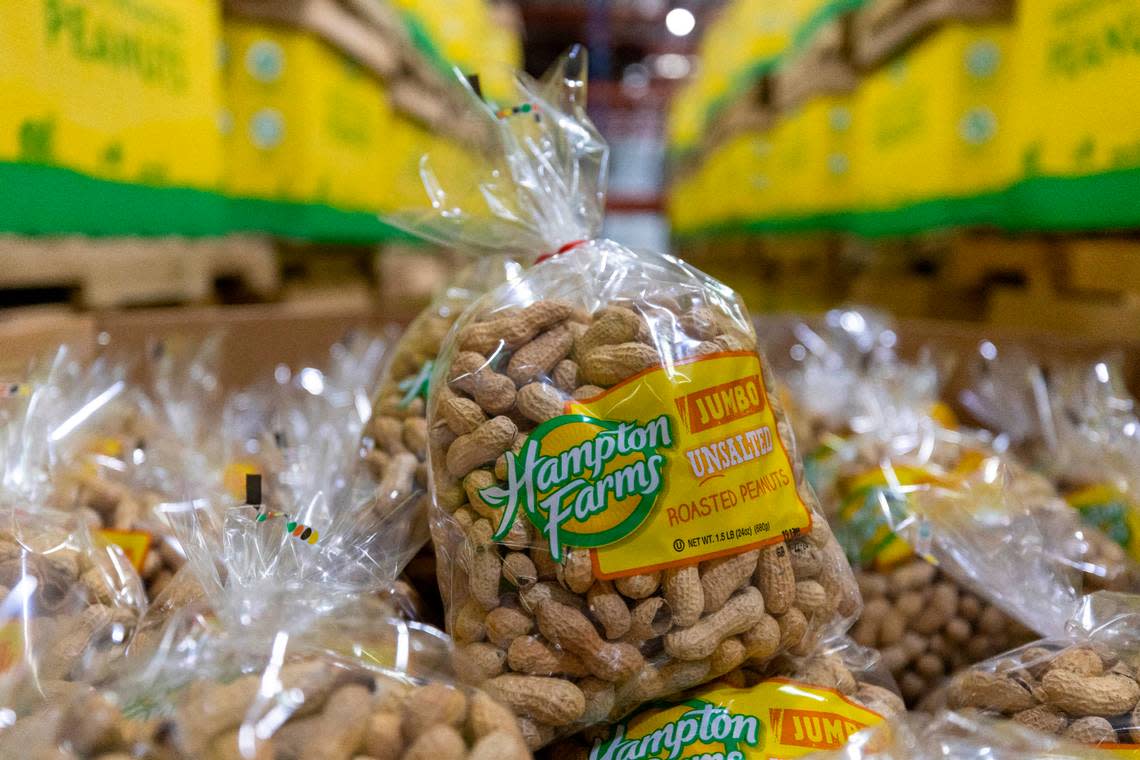
He backed his pick-up truck onto Main Street, a rifle with a scope wedged next to the passenger seat just in case he decided on an impromptu hunting trip. He began sharing the history. The place with the good bologna sandwiches of his childhood had been long gone. So was the service station.
“That man living in that house built the first mill,” he said.
“These two ladies right here worked in the office, until they died.”
“This was a store, and this was a store. And that was a beauty shop, and all kind of stuff in there.”
He pulled back into the factory campus, parked outside a warehouse and held the door open. Inside was an overwhelming aroma of peanuts. The warehouse was refrigerated, the only one of its kind in the country designed for peanuts. In two large rooms there were enormous mounds of peanuts, a pile of them about four stories tall in each room; so many nuts that Watson reinforced the walls with concrete so they wouldn’t collapse under the weight. The peanuts were ready to be processed and bagged, waiting to start their journey either to a store or maybe a ballpark.
Watson casually guessed how many were in there. Probably about 10 million pounds, he said, as if it was nothing, and 10 million pounds of peanuts equated to more than a billion of them. More than a billion nuts, sitting in a cold warehouse in a town where the only thing left is this factory.
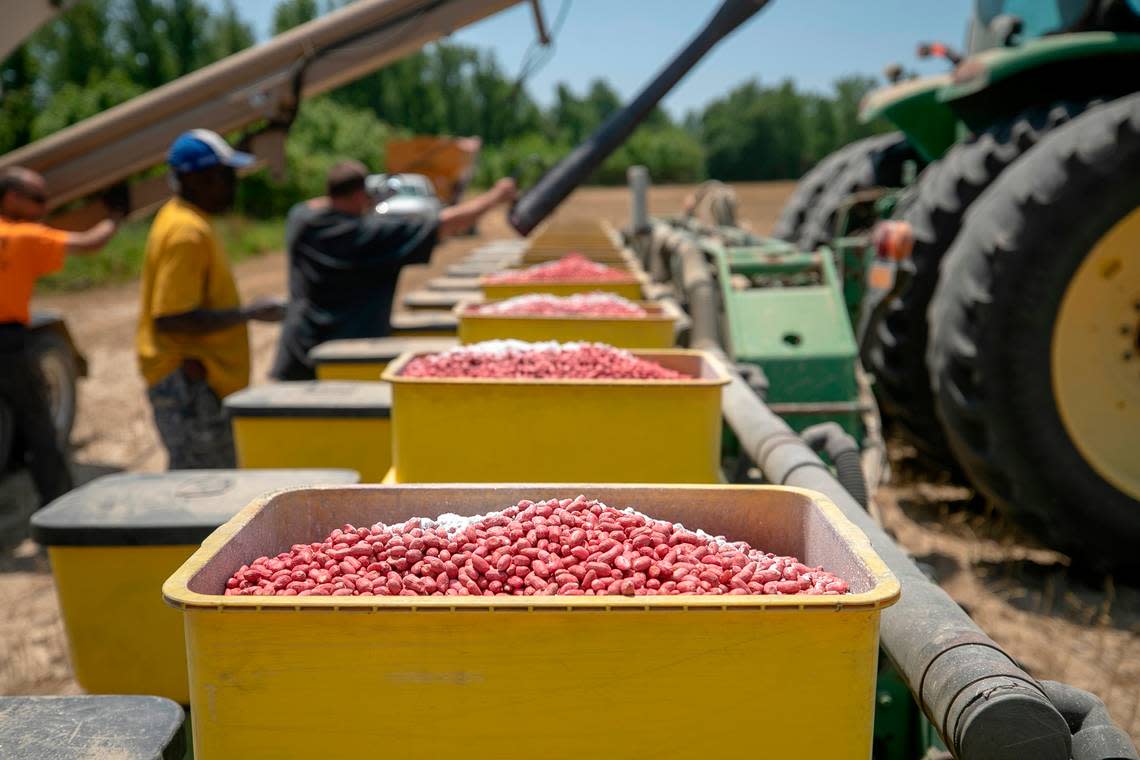
Art, science ... and faith
Back on the farm, the plants were just beginning to bloom. Lassiter leaned down and took a look. A peanut plant rises low out of the ground, among a bushel of green leaves that look a little like lettuce. When it starts to bloom, that’s a good sign. Lassiter saw blooms, small flashes of yellow.
“When you start seeing blooms, that’s when it starts pegging,” he said, kneeling down to get closer. “And those pegs is where your peanut will develop.”
The pegs are underground, stretching into the soil. One peanut plant can produce about 15 or 20 peanuts, assuming everything goes right. Sometimes it doesn’t. Peanuts can be a finicky crop, prone to disease and beholden to the whims of the weather. Hurricanes are always bad news. Sometimes there might not be enough rain. Last year was about perfect, which led to Lassiter’s record yield of more than seven million pounds.
He grows corn, too, and cotton and soybeans. And wheat. Peanuts are probably the most difficult crop, the one that requires the most time in the field, checking and monitoring and tending.
“My granddad always said the best thing you can put in the ground is your footsteps,” Lassiter said. “To get out there and see what’s going on.”
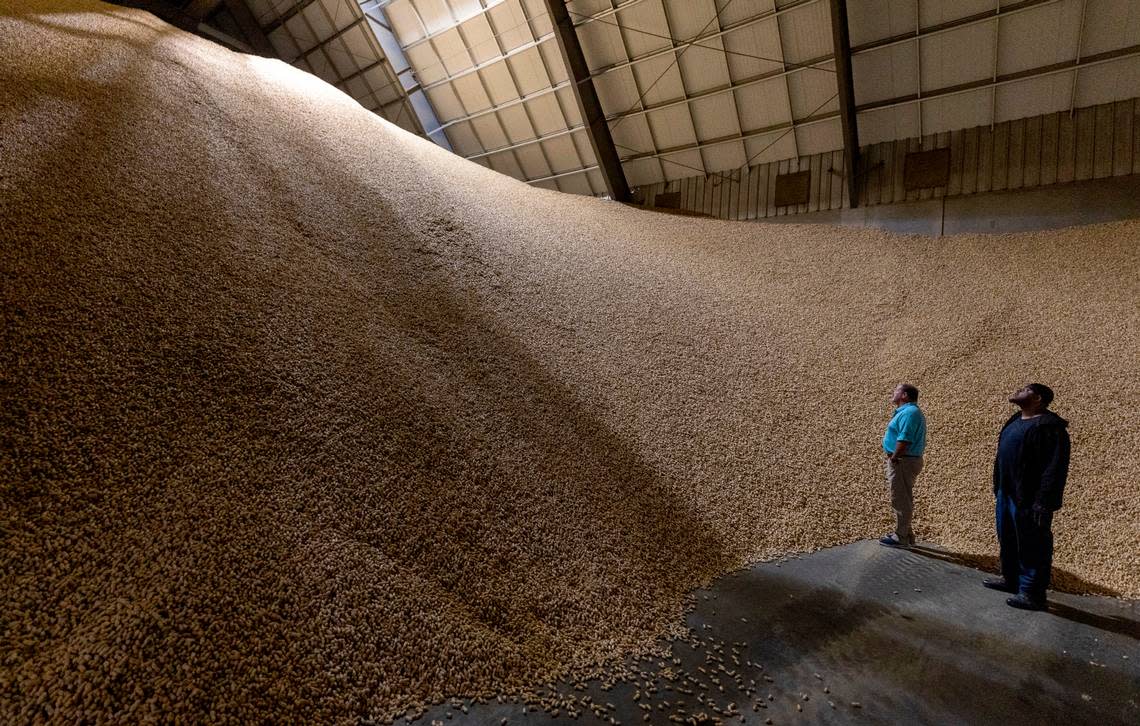
Sometimes there’s only so much anyone can control. He remembers the bad years. Too wet in 2010 and 2020. Too dry in 2002. So far 2023 was shaping up just fine. There’d been enough rain but not too much. The blooms were coming in right on time. The pegs were stretching down in the dirt, peanuts growing unseen.
“It’s part art, part science,” Lassiter said of the process. “And some faith in there, too.”
With any luck, come September and October, his crew would be out here harvesting their way to another memorable haul. Maybe seven million pounds. Maybe more. Soon after, those peanuts would be on their way to the factory and then the bag or the jar or the candy bar.
Now came the waiting and the hoping. The faith that what was in the ground now would eventually be ready for the store or The Show, if they were among the lucky and good enough to make it there.
